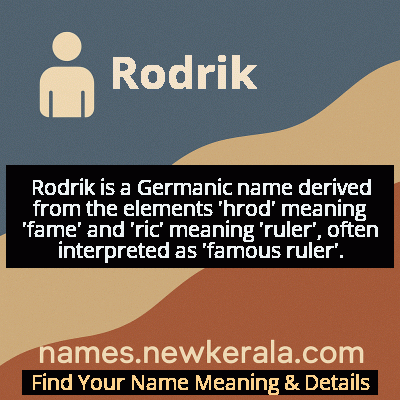Rodrik Name Meaning & Details
Origin, Popularity, Numerology Analysis & Name Meaning of Rodrik
Discover the origin, meaning, and cultural significance of the name RODRIK. Delve into its historical roots and explore the lasting impact it has had on communities and traditions.
Name
Rodrik
Gender
Male
Origin
German
Lucky Number
3
Meaning of the Name - Rodrik
Rodrik is a Germanic name derived from the elements 'hrod' meaning 'fame' and 'ric' meaning 'ruler', often interpreted as 'famous ruler'.
Rodrik - Complete Numerology Analysis
Your Numerology Number
Based on Pythagorean Numerology System
Ruling Planet
Jupiter
Positive Nature
Optimistic, inspirational, and creative.
Negative Traits
Scattered, exaggerating.
Lucky Colours
Yellow, gold, purple.
Lucky Days
Thursday.
Lucky Stones
Yellow sapphire.
Harmony Numbers
1, 2, 9.
Best Suited Professions
Arts, writing, communication.
What People Like About You
Creativity, optimism.
Famous People Named Rodrik
Rodrik the Reader
Noble Scholar
Renowned intellectual lord known for maintaining the largest library in the Iron Islands
Rodrik Cassel
Master-at-Arms
Loyal military commander and trainer for House Stark in Winterfell
Rodrik Stark
King in the North
Legendary monarch who successfully defended the North against ironborn invaders
Rodrik Forrester
Lord
Noble lord famous for ironwood production and strategic political leadership
Name Variations & International Equivalents
Click on blue names to explore their detailed meanings. Gray names with will be available soon.
Cultural & Historical Significance
The name's cultural journey mirrors the historical movements of Germanic peoples across Europe. From its Old German origins, Rodrik spread through Frankish territories into France and Spain (as Rodrigue and Rodrigo), while Norse versions traveled with Vikings to Russia (as Rurik) and the British Isles. This diffusion created a fascinating cultural tapestry where the same core name developed distinct regional characteristics while maintaining its essential meaning. In modern times, Rodrik continues to evoke images of medieval nobility and northern resilience, making it a popular choice in historical fiction and fantasy literature. Its cultural significance lies not just in its historical usage but in its ability to convey specific qualities of leadership, tradition, and strength across different eras and media.
Extended Personality Analysis
The name Rodrik carries strong personality associations derived from its historical bearers and linguistic roots. Individuals with this name are typically perceived as natural leaders with a commanding presence, combining intellectual depth with practical capability. They often exhibit strategic thinking patterns, approaching challenges with careful consideration rather than impulsivity. The 'fame' element in the name's etymology suggests a drive for achievement and recognition, while the 'ruler' component indicates organizational skills and responsibility. Rodriks are frequently described as dependable, honorable, and traditional, yet capable of innovation when circumstances demand. Their leadership style tends to be more authoritative than authoritarian, earning respect through competence rather than coercion.
Beyond the obvious leadership qualities, Rodriks are often associated with protective instincts and loyalty to their communities or causes. They typically demonstrate resilience in adversity and maintain composure under pressure, qualities that made the name popular among medieval military commanders and rulers. The name also suggests a certain gravitas—Rodriks are rarely frivolous and tend to approach life with seriousness of purpose. However, this doesn't preclude warmth or humor; rather, it indicates depth of character. In interpersonal relationships, they're often the stabilizing force, providing guidance and support to others. The combination of these traits creates a personality profile of someone who is both respected and reliable, capable of shouldering responsibility while maintaining personal integrity and vision.
Modern Usage & Popularity
In contemporary naming practices, Rodrik occupies an interesting niche as a distinctive historical name that has gained modern relevance through popular culture. While it remains outside the top 1000 names in most English-speaking countries, it has experienced a noticeable uptick in usage since the 2010s, largely driven by its appearance in George R.R. Martin's 'A Song of Ice and Fire' series and the subsequent 'Game of Thrones' television adaptation. The name appeals particularly to parents seeking strong, traditional names with Norse or Germanic heritage that aren't overly common. Modern Rodriks benefit from the name's uniqueness while carrying its weighty historical connotations. In Scandinavian countries and Germany, variations like Roderich maintain steady, though modest, popularity. The name's current usage pattern suggests it's favored by educated, middle-class families who value historical depth and literary connections. Its rarity makes it stand out while its familiar sound prevents it from being overly exotic. The name's modern appeal lies in this balance between distinctiveness and accessibility, combined with its powerful meaning and cultural resonance.
Symbolic & Spiritual Meanings
Symbolically, Rodrik represents a complex interplay of power, legacy, and earned authority. The name's etymology—combining 'fame' and 'ruler'—creates a powerful metaphor for leadership that is both achieved and recognized. Unlike names that simply denote royal birth, Rodrik suggests rulership earned through accomplishment and reputation. This makes it symbolically rich, representing the ideal of the capable leader who rises through merit rather than mere inheritance. The name also carries connotations of protection and stewardship, evoking images of medieval lords who were responsible for their people's welfare. In broader symbolic terms, Rodrik represents the bridge between thought and action—the strategic mind that can effectively wield power. The name's historical connections to northern European cultures add layers of symbolic endurance, resilience, and exploration. It evokes images of Viking longships and medieval castles, of leaders who expanded territories while maintaining cultural traditions. In psychological terms, the name symbolizes integrated authority—where strength is balanced with wisdom, and power is tempered by responsibility. This makes Rodrik not just a name but a symbolic representation of ideal leadership qualities across multiple dimensions of human endeavor.

